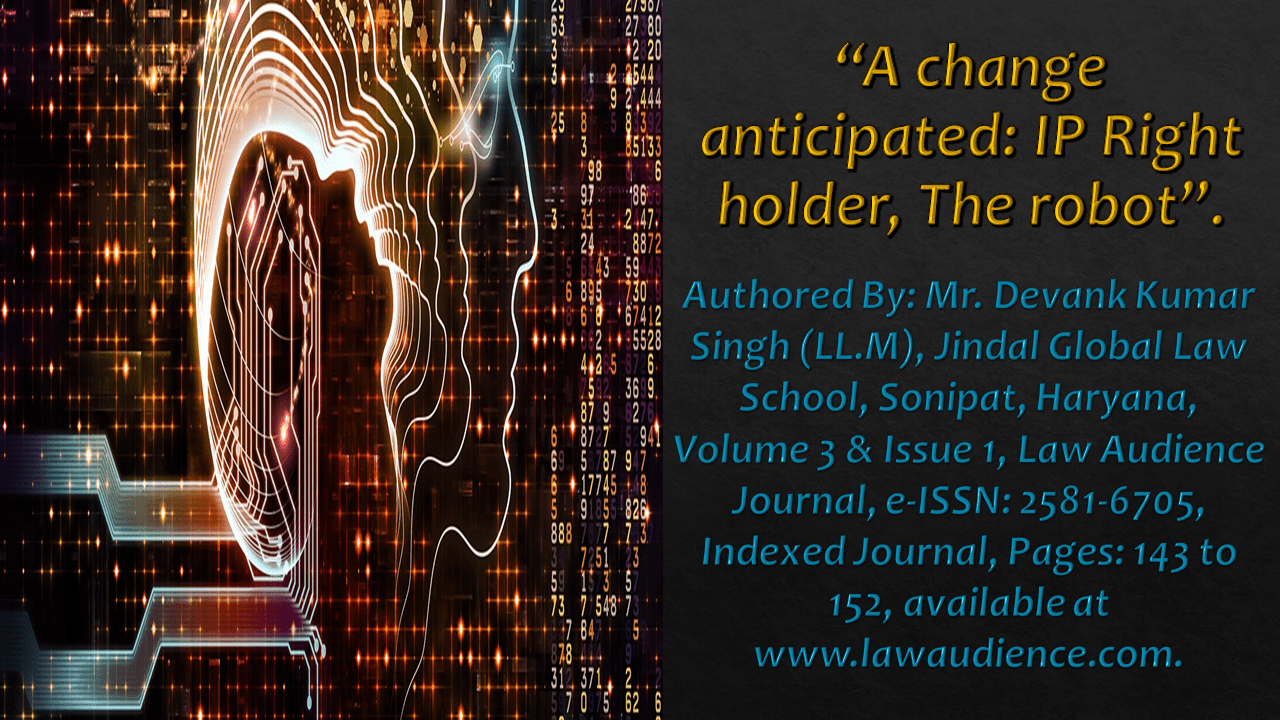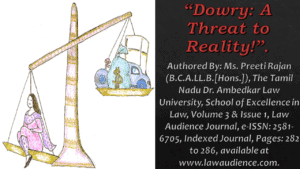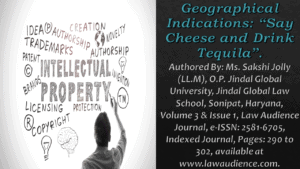Click here to download the full paper (PDF)
Authored By: Mr. Devank Kumar Singh (LL.M), Jindal Global Law School, Sonipat, Haryana, ,
Click here for Copyright Policy.
ABSTRACT:
“The aim of this paper is to give a holistic approach by connecting the dots between artificial intelligence and globalisation in the light of intellectual property. (a) Economic changes, which have made new openings in various zones of the world and advanced the rise of a “sharing economy”, yet additionally Artificial intelligence encouraged tremendous variations both inside and across nations. (b) Legal changes, that have been brought in the field of AI-based IP’s and the focus is upon the deviation of the judgements from the common practice. Such changes help us keep in pace with such changing technologies. The impact of such decisions of various jurisdictions, need to be looked from the perspective of developing as well as developed nations. (c) Technological changes, with the advent of artificial intelligence revolution, which ushered in both fortune and dangers pertaining to job prospects, political polarisation and mass unemployment (i.e., ethical aspects) and wealth distribution. Finally, aims that the Government policies must be robust and stringent enough to curb development as well as employment issues, which might still persist in the developing economies. Not ignoring ethical aspects to be considered thereby, maintaining a balance in the law and development domain are discussed”.
Keywords: Artificial intelligence, Globalisation, Political polarisation, Technological singularity, Intellectual property rights.
1.0 INTRODUCTION:
Intellectual property (hereinafter referred to as IP) has been the force behind innovation and novelty for centuries and can be dated to 500 BC in Greece when protection was provided to innovators where one could reap the benefits of their innovations. We have come a far way from the Paris Convention, and have seen a rapid growth in IPR domain. IP regime has rapidly evolved in the international arena, where the laws have become much more complicated since the inception. IPR as a subject, as well as a law is still evolving but at a ‘viscous pace’ and with technology moving at such a fast pace to achieve singularity (no more a utopia) doesn’t seem synchronous to one another. IP regime needs to keep up with the pace of technology/artificial intelligence and keep a check and balance vis-à-vis rights and liabilities.
Therefore, in the first section of the paper, I delve into the aspect of the evolution of Artificial intelligence (hereinafter referred to as AI), how it came about and what tests were laid down to achieve the AI standards. Further on, a brief introduction has been provided for the reader to understand the concept of AI’s. In the second section of the paper, I examine Artificial intelligence and its linkage to IPR, discussing the laws that have evolved with time and the status quo of such laws worldwide. I turn to give an overview of the aspects related to the growth of IP rights in the domain of artificial intelligence and linking it to the impact it will have on the global expansion.
In the third part of the paper, I further discuss the aspects of globalisation and the government policies that could have a balancing approach considering artificial intelligence, intellectual property and the economy in a virtuous cycle. Also, discussed matters pertaining to having robust laws in place that are necessary to tackle issues pertaining to commercialisation of artificial intelligence. The stance of China and India with respect to the above mentioned and the status quo of the laws worldwide have been further discussed. Looking at the evolution and the decisions of various jurisdictions on the matter of AI based IP’s, now in light of the aforementioned, focus is upon the perspective of India and the advancement of IP laws linking the aspects of globalisation and political polarisation. However, one gets to see a holistic approach vis-à-vis the economy and the ethical viewpoint in the last part.
1.1 EVOLUTION OF ARTIFICIAL INTELLIGENCE:
Alan Turing is worldwide accepted as the father of Artificial intelligence and known for his code breaking computer during World War II. Now for one to be called an AI machine, it needs to pass the so-called ‘Turing test’. The test is very simple, “the response of the computer needs to be indistinguishable from a human response”. In other words, it needs to have human level of intelligence as bare minimum. Perhaps, who could have thought the introduction of ‘Turin test’ in 1950, would lead to creation of Sophia in 2016, a humanoid robot by Hanson robotics. The progression of technology is so fast that we have AI’s like apple’s Siri (virtual assistant-2011), Google’s home device (2016), Amazon’s Alexa (2014) and so on. Now looking back at the span of a 10 years or so, one can safely conclude that we are assuming ‘Technological Singularity’ i.e., at present the rate at which technology is evolving, no one would have a clue or could predict the pace of its development. Hence, leading to the commercialisation of much smarter devices/technology at an inevitable pace.
Artificial intelligence needs to fulfil three main components:
Firstly, ‘Intentionality’: It means a system would be able to make decisions on its own rather than being programmed with ready responses.
Secondly, ‘Intelligence’: AI’s must be able to interact with data analytics and machine learning program.
Thirdly, ‘Adaptability’: Most important precondition of an AI, that it must be able to make decisions, receive new data and interpret the outcomes on its own.
2.0 POSITIONALITY OF ARTIFICIAL INTELLIGENCE VIS-A-VIS INTELLECTUAL PROPERTY RIGHTS:
There are two types of artificial intelligence Specialist AI (Weak) and Generalist AI Strong):
Specialist AI’s are designed to do specific tasks, for example self-driving cars, chatbots, etc. Google, Amazon and Netflix also use artificial intelligence to analyse consumer browsing patterns. Generalist AI’s as the name suggests, they are smarter in a holistic manner, and have the capabilities vis-a-vis performance tasks or intellectual tasks to surpass humans as well. On this view, issues never arise with the former but only the latter because such kind of Strong AI’s are capable of creating or inventing a new intellectual property, for example a new copyrightable sound or video, etc. From all accounts, one may say that there could be consequences of the same, however at such a stage of development; Artificial intelligence seems more promising than dangerous, especially, in case of India in the field of agriculture and healthcare on which our economy mainly relies upon.
2.1 Do we have robust laws in place which are necessary to tackle issues pertaining to commercialisation of artificial intelligence? What is the stance of China and India?
To begin with neither soft law nor hard laws are active at present, as the World Intellectual Property Organisation (hereinafter referred to as WIPO) has called out for feedback apropos of the possible outcomes/impacts of AI in the IPR domain in toto. The above statement clearly shows the maturing and trying to keep up with the pace of the world attitude.[1]
2.1.1 Status quo of the law worldwide:
At present, only a person is allowed to be a ‘proprietor or owner’ of an IP (Naruto vs. Slater Case). In furtherance of this, it clearly means that an AI has no claim over intellectual property, hence cannot be a subject matter of registration. The logic and reasoning behind this were that, if someone’s right was infringed then from whom does one claim damages or ask for an injunction. But breaking all the barriers in the TANCENT Case, the Chinese courts held that an article generated by an AI is protectable under Chinese copyright law.[2] “Holding a contrary view, the European patent office (EPO) in the case pertaining to patent applications filed by ‘DABUS’ an AI technology, gave a finding similar to Naruto when it held that application has to be filed by human being.”[3] However later on it was discussed that the laws are currently not in place pertaining to AI based IP filings, unfortunately it was refused. In light of the above-mentioned judgement/decisions, one can see as to where we are heading and clearly a shift is seen in the IP regime pertaining to AI based properties. However, commercialisation of the AI’s seems to dilute IP rights as no one can deny the fact that they are faster and better in generating intellectual property than humans.
2.1.2 A Perspective on India apropos of AI:
India’s IT sector seems to be growing at a fast pace, it has also contributed to important sectors such as agriculture, healthcare, etc., by systems such as integrated crop management or online trading respectively. Unlike USA and China, India lacks resources (i.e., facilities & funds) and accessibility. As we all know that India’s health sector is in a dire need of development and investment. Drug pricing issues are out of the way now, and therefore major impediments in the healthcare sector are removed. AI’s support would eventually thrive in such a sector.
Research and development in India in the case of Strong AI’s are rigorously limited, hence commercialisation seems quite far-fetched as of now. In contrast China is a country that is taking calculative steps to becoming an AI giant by 2030. Step 1, Appreciating artificial intelligence-based application by 2020. Step 2, making cutting edge achievements in the same field by 2025. Step 3, becoming a Tech-giant of the industry by 2030. Post TANCENT Case[4], the change in line of action is seen from the Chinese judiciary as well.
2.1.3 Arguendo: Evolution of IP laws and AI’s in India:
WIPO (World intellectual property organisation) has invited applications for discussion in the domain of Artificial intelligence on Intellectual property, where the member states are yet to come on to terms with AI based IP’s. “While beginning its public consultation process on AI and IP policy, Director-General of WIPO Mr. Francis Gurry said: “Artificial intelligence is said to radically alter the way in which we work and live, with great potential to help us solve common global challenges, but it is also prompting policy questions and challenges.”[5]
At present, India has outrightly not made any developments pertaining to AI based IP’s, nor the stance of any court in the said field have shown such willingness to develop the law. In my opinion post-WIPO final discussions would certainly carve out a framework. However, it will be interesting to see how India is going to balance the laws of an AI based IP with the research & investment aspect of this developing nation. In light of this, India has established Centre for Artificial intelligence and robotics under the supervision of DRDO but again facilities and expertise would be a major hurdle in the future.
3.0 GLOBALISATION, ARTIFICIAL INTELLIGENCE AND POLITICAL POLARISATION: ECONOMICAL AND ETHICAL VIEWPOINT:
There is no denying that Artificial intelligence, Global expansion and international businesses go hand-in-hand. “The McKinsey global Institute recently analysed economic data from the United Nations, the World Bank, and the world economic forum and reported that by 2030, AI has the potential to add 16% or about $13 trillion to the global economy. It also reported that at least 70% of the companies are likely to have adopted at least one form of artificial intelligence technology around the globe.”[6] This clearly shows the interconnectedness and benefits of Globalisation however, ushering into the era of some say de-globalisation, there would only be a few dislocations in developing countries as labour will be replaced by robots. For instance, Lenskart makes 100% bot-made spectacles which are undeniably better than any man-made ones. Unlike the Industrial and Computer revolution; the AI revolution may not abolish certain jobs but replace them with others. In spite of the ethical arguments, AI’s are certainly going to wide scale decimation of skilled jobs (mostly lower paid one’s) but creation of some professional jobs in many new domains.[7] USA and China have already amassed the resources, talent, market share, data to dominate and make huge amounts of profits. Everyone, perhaps knows that the Internet is the most viable aspect of globalisation and Internet globally connects/integrates people around the world. Internet is the base ‘necessity’ to run artificial intelligence. Now connecting this aspect to the Internet consumer market which comprises of seven major multinationals across the globe, three from China namely, Alibaba, baidu and tancent while four from America namely, Microsoft, Google, Amazon and Facebook. Observing the aforementioned, in my opinion American business would dominate the developed economies while China would do the same in the developing economies without a doubt. I believe that as countries are already dependent upon China and US, hence capturing the AI market will further create inequality in the international domain. As we all know that Political polarisation is already in place and such economic support could widen the gap even more.
3.1 AI impacting Economic growth:
If it wasn’t for Globalisation, AI might not have seen the light of the day at the current pace. It has led to:
- Increasing Productivity and Trade Opportunities: AI has ‘macroeconomic effects’ as an impact on economic growth. For instance, it increases productivity which in turn increases economic growth, thereby increasing opportunities for worldwide trade.
- Better management, complex production units and expansion of digital platforms: A person sitting at home can watch Netflix or order international product or could also work internationally sitting in his origin country. It is a clear sign of Globalisation as a blessing but it is the AI that has made the functioning of such technologies extremely smooth and without any errors.
- Improving Trade negotiation: AI doesn’t only enhance communication but the outcome as well. Artificial intelligence can be used to predict the responses and predict outcomes, thereby, helping parties to negotiate with an added advantage (Depending upon how strong the coding/programming of such an AI), and more.
Artificial intelligence impact on the future global expansion can be observed in the report of the McKinsey global Institute who estimated that effect AI’s are likely to show growth, increasing in an S shape curve.[8] Its impact would be three times higher by 2030, which would further improve prediction of future trends and increase smart-tech manufacturing. Also, the Internet of things (IoT) would be a beauty to look at, where one can’t even imagine the possibilities that the future holds for us.
3.2 An Ethical viewpoint on AI:
The foremost question that arises in one’s mind is whether AI is going to create mass employment or not? Now, for instance Amazon has been alleged of destroying traditional retailer’s job by enticing people to do online shopping. Amazon claims that they have been hiring warehouse workers who work happily alongside with 100,000 robots (Weak AI’s). But what would happen if Stronger AI’s enter the market in future? Expecting such a future doesn’t seem a utopia anymore. Even Martin Ford author of ‘Rise of Robots’ (2015) states that with the introduction of future technology, displacement of workers would inevitably take place. In my opinion, in a developing economy such as India or China where population and unemployment rates are the key aspects, many would lose their jobs in the next two decades. To get rid of such a scenario the Government must make robust policies focusing on the future. In light of this, I opine that the man force will be needing retraining for jobs that would be more inclined towards planning, creativity and cross domain thinking characteristics which obviously are hard to code/program in robots.
AI’s technology to be used in life after death i.e., Immortality? Series such as Upload on Amazon, Black mirror and the Hell of Digital Heaven etc., shows the shift that humans are willing to go to such an extent and really moving towards ‘technological singularity’. Lately, even in Europe and China the scientists have found some success on the ‘life after death’ aspect where mind uploads could happen and we can stay inside AI’s till we don’t wish to die. I ask you, is this ethically, correct? Now, we might have achieved the threshold of technology (albeit more to come) but taking the power of nature into one’s hand seems quite a ridiculous idea. However, whatever it be one cannot deny such a utopian idea to become a reality someday.
4. CONCLUSION:
“Some AI experts predict that AI will be able to do anything that humans can, but do it better. This is a questionable assumption, but AI will surely surpass humans in specific domains. A chess computer beating the world chess champion was the first example. If AI were to develop to the point that it can do everything better than humans, it would mean that it would also do better in science and technology.”[9] But to what extent and at what cost? Humans have done everything for development but they forget the price one has to pay, albeit with regard to natural resources or humanity (ethical and economical perspective). The progression of AI based IP rights is the first step towards it.
From an economic viewpoint, AI’s may be beneficial as it supports the capitalist approach but what about nations where the population percent is too high, where will the jobs generate from. Such developing nations, will only face unemployment which at present due to the pandemic are already suffering. India or any developing economy needs to balance out the approach and come out with a robust approach and take stringent actions/measures to deal with such aspects. India through its tech industry has started taking steps towards improvement in the AI domain (albeit Weak AI’s) and has asked it’s think tank ‘NITI (National Institution for transforming India) Aayog’ for improvement in the said domain to its national programs on AI,[10] however we are hoping to see India match up with the pace of China, Europe and USA. Several unknown issues are yet to see the light of the day vis-a-vis commercialisation of AI.
‘Every action has an equal and opposite reaction’ (Newton’s third law), so if cons are there, pros are there as well. Artificial intelligence will always lack one thing i.e., emotional characteristics. Now they can be smarter, faster, precise and without errors but can never replace humans. It is the humans that have led to their creation and not only that they can have an adverse impact in their functioning, if hacked or attacked with a virus. They do have constraints but their dissemination is inevitable without a doubt in the future. Finally, with the advent of technology/AI’s there are a lot of aspects to be covered and some of which we are still unaware about.
Footnotes:
[1] WIPO Begins Public Consultation Process on Artificial Intelligence and Intellectual Property Policy, published by World Intellectual Property Organization (WIPO); PR/2019/843; published on December 13, 2019, https://www.wipo.int/pressroom/en/articles/2019/article_0017.html).
[2] Stefano Zaccaria, AI-written articles are copyright-protected, rules Chinese court, World Intellectual Property Review (WIPR); published on January 10, 2020 (https://www.worldipreview.com/news/ai-written-articles-are-copyright-protected-rules-chinese-court-19102).
[3] Contemporary And Upcoming Issues In The Field Of Intellectual Property Rights, https://www.thepeninsula.org.in/2020/09/10/contemporary-and-upcoming-issues-in-the-field-of-intellectual-property-rights/ (published on September 10, 2020).
[4] AI-written articles are copyright-protected, rules Chinese court, World Intellectual Property Review (WIPR); https://www.worldipreview.com/news/ai-written-articles-are-copyright-protected-rules-chinese-court-19102 (published on January 10, 2020).
[5] WIPO Begins Public Consultation Process on Artificial Intelligence and Intellectual Property Policy, PR/2019/843, World Intellectual Property Organization (WIPO), Geneva; https://www.wipo.int/pressroom/en/articles/2019/article_0017.html (published on December 13, 2019).
[6] The Impact of AI on Global Expansion, https://www.globalization-partners.com/blog/the-impact-of-ai-on-global-expansion/ At 1.
[7] Donata Francescato, Globalisation, Artificial Intelligence, Social networks and Political polarisation: New challenges for community psychologist, Community Psychology in Global Perspective (CPGP, Comm. Psych.) Glob. Persp. Vol 4, Issue 1, 20 – 41.
[8] id. At 4.
[9] id. At 6.
[10] National Strategy on Artificial Intelligence, published by NITI Aayog; https://niti.gov.in/national-strategy-artificial-intelligence.
Cite this article as:
Mr. Devank Kumar Singh, A change anticipated: IP Right holder, The robot, Vol.3 & Issue 1, Law Audience Journal, Pages 143 to 152 (14th June 2021), available at https://www.lawaudience.com/a-change-anticipated-ip-right-holder-the-robot/.



